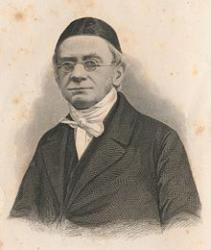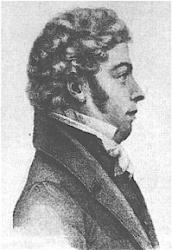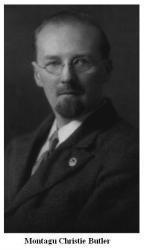Planning worship?
Check out our sister site, ZeteoSearch.org,
for 20+ additional resources related to your search.
- |
User Links
Person Results
Gottlob Baumann

1794 - 1856 Author of "Der im Heiligtum Du wohnest" in Gesangbuch mit Noten
Gottlob Baumann
S. J. Hedborn

1783 - 1849 Person Name: Samuel J. Hedborn Author of "Psalm 29" in The Covenant Hymnal Samuel Johan Hedborn, born 14 October 1783 in Kolstad, Heda parish in Östergötland, died 26 December 1849 in Assjö rectory in Askeryds parish, Jönköping in Småland, was a Swedish writer, wise and hymn writer.
Hedborn was born in a soldier in the village Kolstad out on Östgötaslätten and had all his youth and first study in Linköping and then at Uppsala University 1806 - in 1809 a struggle against poverty, was ordained last year. After his ordination, he was first a curate in Östergötland same year, teachers in Stockholm in 1812 and extraordinary court preacher in 1815. In Uppsala and Stockholm , he became good friends with many Swedish romantic, including Atterbom, which also had its roots in Östergötland and northern Småland. Hedborn became one of the Aurora League's founders and helped in Phosphoros and Poetic calendar, where he published a number of poems, some of which Lullaby (Ute summer breeze blowing) is probably his best known. 1810-14 Hedborn suffered from depression, which at times made him unable to attend to his duties. During this time he developed into religious poet and published two collections of Psalms (1812-13). After a long silence gathered Hedborn his poems in memory and poetry, beginning of an autobiography, which is mostly about his childhood.
Samuel Johan Hedborns collected writings were published with biography of Per Daniel Amadeus Atterbom in two bands in 1853.
He was vicar in his mother's home parish Askeryd in Linköping diocese from 1820 until his death, where Hedborn also is buried at Askeryds church during a cast iron cross. Hedborn is represented in the 1986 hymnal with original texts of five works (No 120, 132, 329, 347 and 391) and processing/translation of a hymn (No. 104).
He is buried in Askeryds cemetery east of Aneby.
--sv.wikipedia.org/wiki
S. J. Hedborn
Nicolás Martínez
1917 - 1972 Person Name: N. Martínez Arr. of "¡Despertad! la Voz Nos Llama" in Cántico Nuevo
Nicolás Martínez
Dimas Planas-Belfort
1934 - 1992 Person Name: Dimas Plenas-Belfort Translator of "Despertad" in Libro de Liturgia y Cántico
Dimas Planas-Belfort
Matthias Jorissen
1739 - 1823 Person Name: Jorrison Author of "Preis't den Herrn! Ihm Lob zu singen" in Gesangbuch für deutsche Gemeinden
Matthias Jorissen
August W. Kjellstrand
1864 - 1930 Person Name: August W. Kjellstrand, 1864-1930 Translator of "Holy Majesty, before You" in Lutheran Book of Worship August William Kjellstrand, 1864-1930
Born: February 10, 1864, Skoefde, Västergötland, Sweden.
Died: October 29, 1930.
Kjellstrand’s family emigrated to America when he was six years old. He was educated at Augustana College, Rock Island, Illinois (graduated 1885), and served as an organist and school teacher in Chicago, Illinois, before joining the faculty of Bethany College, Lindsborg, Kansas, in 1886 as a Latin teacher. He became dean of the Latin Department there in 1893, staying until 1897, when he graduated from Augustana Theological Seminary and went to a pastorate in Fitchburg, Massachusetts. After that, he was pastor for three years at Gloria Dei Lutheran Church in Providence, Rhode Island. In 1906, he went to Augustana College and Academy, becoming academy principal in 1923, and was also pastor of Grace Lutheran Church, Davenport, Iowa (1908-21).
© The Cyber Hymnal™ (http://www.hymntime.com/tch)
August W. Kjellstrand
Johann Baptist von Albertini
1769 - 1831 Person Name: Albertini Author of "Deine Todten sollen leben!" in Evangelisches Gesangbuch mit vierstimmigen Melodien Albertini, Johann Baptist. s. of Jakob Ulrich v. Albertini, a native of the Grisons, Switzerland, who had joined the Moravians, and settled among them at Neuwied, near Coblenz, b. at Neuwied Feb. 17, 1769. After passing through the Moravian school at Niesky, and their Theological Seminary at Barby, in both of, which he had Friedrich Schlciermacher as a fellow-student, he was, in 1788, appointed one of the masters in the Moravian school at Niesky, and in 1789 at Barby. In 1796, he was appointed tutor at the Theological Seminary at Niesky, and ordained as diaconus of the Moravian Church. Up to this time he had devoted himself chiefly to the study of the Oriental languages, and of botany, but now his studies of Holy Scripture for his theological lectures and for the pulpit, brought him to the feet of Christ, whose earnest and devoted disciple and witness he henceforth became. In 1804 he relinquished his tutorial work to devote himself entirely to ministerial labour in Niesky, where he was, in 1810, ordained presbyter. In Feb. 1814 he went to Gnadenberg, near Bunzlau, Silesia, as head of the Girls' School, and preacher; and while on a visit to Herrnhut, was, Aug. 24, 1814, constituted a bishop of the Moravian Church. By the synod of 1818, he was appointed to Gnadenfrei, near Reichenbach, Silesia, and after three years of faithful and successful labour, was chosen one of the heads of the Moravian Church (one of the UnitatS'Aeltesten-Conferenz), his special department being the oversight of their charitable and educational establishments ; and in 1824 President of the Conference. In love and meekness he ruled and visited the churches till, in Nov. 1831, an illness seized him, which terminated fatally at Berthelsdorf, near Herrnhut, Dec. 6, 1831. (Koch, vii. 330-334; Allg. Deutsche Biog., i. 216-217.) Distinguished as a preacher beyond the bounds of his church, he was, in the estimation of Koch, apart from Novalis, the most important hymn-writer of his time— spiritual, simple, and childlike. Yet it must be said that his brother Moravian, G. B. Garve, and E. M. Arndt, are more fully represented in hymnals since 1820. Albertini's hymns appeared to the number of 400, (many, however, being single verses,) in his Geistliche Lieder fur Mitglieder und Freunde der Bruder-yemeine, Bunzlau, 1821 (2nd ed. 1827). None of them have passed into English common use, and the only three we have to note are:—
i. Brenne hell, du Lampe meiner Seele. [Second Advent.] On the Lamp of the Wise Virgin. 1st pub. 1821, as above, p. 139, in 3 stanzas of 8 lines. The only translation is, "Lamp within me! brightly burn and glow," by Miss Winkworth, 1869, p. 311.
ii. Freund, komm in der Fruhe. [Morning.] 1st pub. 1821, as above, p. 273, in 5 st. of 10 1. Tr. as, " Come at the morning hour," by Miss Borthwick in Hymns from the Land of Luther 1862 (cd. 1862, p. 256; 1884, p. 190).
iii. Langst suchtest du, mein Geist! ein nahes Wesen. [Christmas.] 1st pub. 1821, as above, p. 9, in 5 stanzas of 6 lines. Translated as, "Long in the spirit world my soul had sought," by Miss Winkworth, 1855, p. 191 (later eds. p. 193), assigned to St. Thomas's Day.
-John Julian, Dictionary of Hymnology (1907)
Johann Baptist von Albertini
S. Headborn
Person Name: Samuel J. Hedborn, 1783-1849 Author of "Holy Majesty, before You" in Lutheran Book of Worship
S. Headborn
Montagu C. Butler

1884 - 1970 Person Name: M. C. Butler Translator into Esperanto of "Praise the Lord through every nation" in Adoru kantante Montagu Christie Butler, born 25 January 1884 in London, died 5 May 1970, Son of Thomas Robinson Butler.
Montagu C. Butler
Britt Hallqvist
1914 - 1997 Person Name: B. G. Hallqvist Author of "[Höga majestät, vi alla]" in Den svenska psalmboken med tillägg (tredje utgåvan)
Britt Hallqvist


 My Starred Hymns
My Starred Hymns

